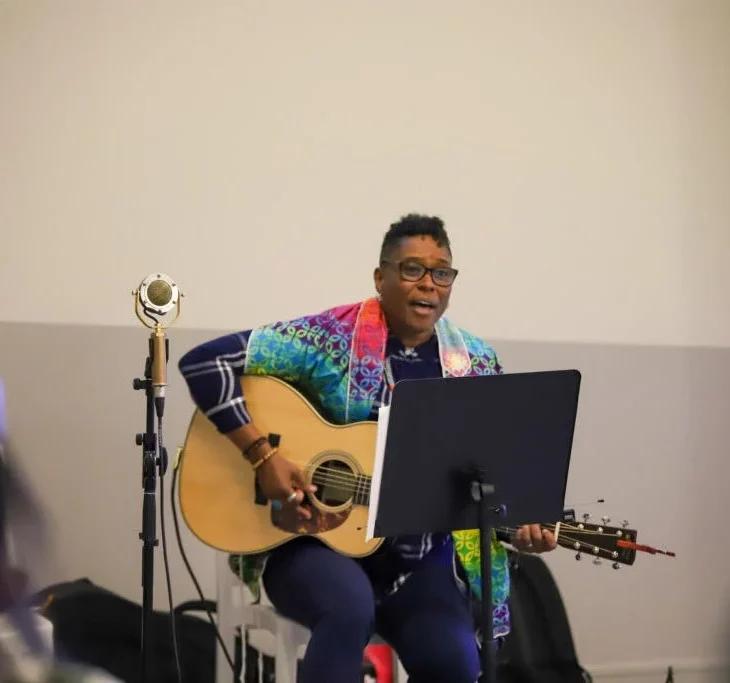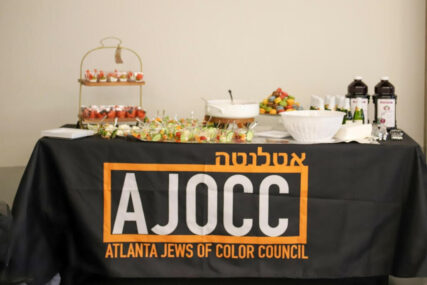A Pioneering Shabbat Service Marks a New Way to Observe Jewish Juneteenth
June 20, 2022

(RNS) — The songs sung at this Friday night Sabbath service included the traditional, “Lecha Dodi,” as well as “Wade in the Water.”
The musical accompaniments were a guitar and an African drum.
This pioneering service marking Juneteenth — the day (June 19) in 1985 when Maj. Gen. Gordon Granger arrived in Galveston, Texas, to deliver the message the Civil War was over and the enslaved were free — was a first in many ways.
Held at the Distillery of Modern Art, an event space 18 miles north of downtown Atlanta that also serves as a gallery and cocktail lounge, it was the first Jewish service organized and led by Jews of color to mark the annual celebration of freedom that is now a federal holiday.
“Jewish demographics are changing rapidly,” said Rabbi Sandra Lawson, one of the organizers and the leader of Kol Hapanim or “All the Faces,” an inclusive Jewish worship group. “We need to recognize there are sizable numbers of Jews of color. Because there are a lot of Black people in the Jewish community, we need to celebrate Juneteenth.”
While American Jews are overwhelmingly white, they have slowly embarked on a new racial awareness.
Jews of color represent 12% to 15% of their population, according to a 2019 analysis. A 2020 Pew survey also found that among American Jews aged 18 to 29, 15% identify as multiracial.
Friday night’s service, co-sponsored by the Atlanta Jews of Color Council, was one of several Jewish Juneteenth commemorations this weekend. In Greensboro, North Carolina, Temple Emanuel’s Friday service focused on efforts of white congregants to desegregate the Woolworth lunch counter during the 1960s Civil Rights movement.
Washington Hebrew Congregation in D.C., celebrated by sending a delegation to Saturday’s Moral March on Washington. On Sunday it screened a movie, “Who We Are: A Chronicle of Racism in America.”

The Atlanta Jews of Color Council co-sponsored the Juneteenth Shabbat service on June 17, 2022, the first to be planned and organized by Jews of Color. Photo courtesy Dedra Walker/Emory Rose Photography.
In Atlanta, the service led by Lawson and Koach Baruch Frazier, a rabbinical student at Reconstructionist Rabbinical College in the Philadelphia suburbs, was attended by 60 people in person and another 400 online, with people watching across the United States, Canada, and as far away as Melbourne, Australia.
It began with the traditional Hebrew blessing “Shehecheyanu,” commonly recited on special occasions to thank God for new and unusual experiences. Lawson and Frazier then riffed on “Woke Up This Morning with my Mind Stayed on Freedom,” and “Ain’t Gonna Let Nobody Turn Me Around,” popular Black spirituals.
“The Torah says in multiple places that you cannot enslave humans forever,” said Frazier who gave a short sermon or “drash” toward the end of the service. “Doing so is an affront to God.”
Frazier then turned to the weekly Torah portion, the book of Numbers 9, in which Moses instructs the Israelite people on how and when people unable to celebrate the Passover feast of freedom at its regular time can do so later.
Just as the enslaved people of Galveston, Texas, celebrated their freedom two and a half years after the 1863 Emancipation Proclamation, so too, there were provisions in the Torah for a second Passover, Frazier observed.
“In our own striving for liberation there have been moments of utter despair and of relief and gladness,” Frazier said. “As we honor our ancestors and their charge to us to never let anyone take away our joy, may we keep on walking, keep on marching and celebrating dignity until we find ourselves in our own promised land of redemption.”
Victoria Raggs, executive director of the Atlanta Jews of Color Council, said it was appropriate that the first known Jewish Juneteenth organized and led by Jews of color was held in Atlanta, the birthplace of the Civil Rights movement.
The nonprofit started three years ago advocates for Jews of color across the South and seeks to ensure their representation in a variety of Jewish communal spaces, including synagogues, Jewish day schools and Jewish summer camps.
“As Jews we’re not an island to ourselves,” Raggs said. “Everything is connected. This is our time to live out our values and the values of America, of freedom and justice for all.”
Share
Related Articles
American Civic Life
Higher Education
Higher Education



